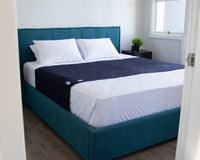Many people with Alzheimer's or Dementia develop a loss of bladder or bowel control (incontinence) as the disease progresses to moderate (intermediate) and severe (advanced) stages. The most common causes include the inability to recognize natural impulses which result in incontinence.
If a person with Dementia or Alzheimer’s has started to lose control of their bladder, it is important to determine the possible causes.
These include:
- Medical conditions: See a doctor to determine if the cause is medical and treatable.
- Medications and diuretics: Sleeping pills and some other medications can relax the bladder muscles. Some beverages such as coffee and tea can act as diuretics, which increase urination.
- Dehydration: Limiting fluids can cause dehydration, which could lead to a urinary tract infection and increased incontinence.
Advice for dealing with incontinence
Here are some tips for carers of people with Alzheimer's who experience incontinence.
-
Be patient and understanding: Urinary and bowel accidents can be hard to talk about. Find ways to maintain their dignity by saying things such as ‘anyone can have an accident’ and don’t make them feel guilty about it.
-
Communication: Encourage them to tell you when they need to use the toilet. Keep an eye on non-verbal signs such as restlessness, unusual sounds, changes in expression or sudden silence. These signs can indicate if they need to go to the bathroom. They may use words that have nothing to do with going to the toilet. It’s helpful to learn the words or phrases they use when they want to go to the bathroom.
-
Make it easier for them to find the toilet: Keep the bathroom door open at all times. Consider decorating the bathroom in a way that they will recognise that this is a different room to others. Paint the bathroom door or put a picture of a toilet on the door. Make the bathroom safe and easy to use and remove all unnecessary objects that would make them confused.
-
Plan ahead: Observe and recognise their bathroom schedule. Remind them to use the bathroom just before their usual time. Try to establish a regular schedule to use the bathroom. For example, help them go first thing in the morning, every two hours during the day, immediately after meals and just before bedtime. Identify when accidents occur and plan what to do.
-
Follow up: Check the toilet to see if they are using it. Help them clean up and regularly wash sensitive areas.
-
Monitor fluids: Encourage them to drink liquids but limit their consumption before going to sleep. Reduce the fluids that could increase urination such as coffee, tea or soda.
-
Adapt and innovate: Give them enough time to empty their bladder. If they are having difficulties urinating, you can try to leave the water running from the sink or give them drinks to stimulate their bladder. Choose clothes that are easy to remove and clean. Consider the use of incontinence underwear as it can be useful in places when the toilet is not accessible. Use waterproof and absorbent linen and mattress protection to ensure a dry, comfortable and restful night sleep.
Remember you are not alone
NIGHT N DAY is a registered NDIS provider.
----------------------------------------------------------------------------------------------
Should you require any product assistance … Did you know that we manufacture a complete range of incontinence products including absorbent underwear and waterproof pads? Some of these products also double as period-proof underwear.
We're with you Night n Day
If you have any questions about incontinence or want to know what incontinence products are the best for you or your loved one don’t hesitate to contact our friendly Customer Service team
- THERE’S NO SUCH THING AS A SILLY QUESTION!
----------------------------------------------------------------------------------------------
Email: gday@nightnday.com.au
Australia: (02) 9531 2011
International: +61 2 9531 2011
P: +61 2 9531 2011
Disclaimer: No content on this website, or in this article, regardless of date, should ever be used as a substitute for direct medical advice from your doctor or other qualified clinician.







